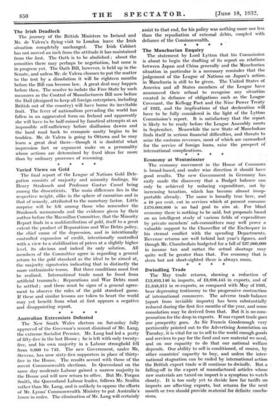The May trade returns, showing a reduction of £18,893,140 in
imports, of £3,698,445 in exports, and of £1,848,315 in re-exports, as compared with May of 1931, bear depressing testimony to the progressive contraction of international commerce. The adverse trade balance (apart from invisible imports) has been substantially reduced during the first five months of the year, and some consolation may be derived from that. But it is no com- pensation for the drop in exports. If our export trade goes our prosperity goes. As Sir Francis Goodenough very pertinently pointed out to the Advertising Association on Tuesday, it is vital for us to sell to the world enough goods and services to pay for the food and raw material we need, and on our capacity to do that our national welfare depends. Our ability to sell is conditioned, of course, by other countries' capacity to buy, and unless the inter- national stagnation can be ended by international action the British export trade w ill continue to dwindle. But a • falling-off in the export of manufactured' articles whose raw materials are taxed on import is a symptom to watch closely. It is too early yet to decide how far tariffs on imports are affecting exports, but returns for the next month or two should provide material for definite conclu-' sions.








































 Previous page
Previous page